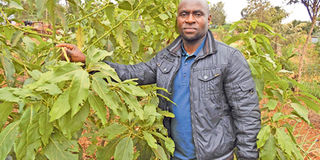Lessons from a lecturer’s organic farm

David Mugambi in his farm in Tharaka Nithi. Integrated organic farming, according to him, ensures long-term fertility in degraded soils while maintaining the organic matter levels and producing chemical-free foods. PHOTO | CAROLINE WAMBUI | NATION MEDIA GROUP
What you need to know:
- The farm is a collection of sweet potatoes, cassava, macadamia, pawpaws, bananas, gravelia trees and napier.
- The father of three also rears 40 chickens and 60 goats, with the organic integrated farming paying great dividends for him.
- To grow his crops, Mugambi uses organic manure from both his chickens and goats and practices mulching to conserve moisture in the soil.
- On his farm, gravellia trees act as a boundary crop that not only provide shade, but he also sells them for timber and building materials.
Some three kilometres from Chuka Town along the Kathigiririni Road in Tharaka Nithi County, one finds David Mugambi’s farm, a crop’s haven.
The one-and-a-quarter-acre farm is teeming with an assortment of plants, thanks to good agronomic practices that see him combine crops with agroforestry, all farmed organically.
The farm is a collection of sweet potatoes, cassava, macadamia, pawpaws, bananas, gravelia trees and napier.
The father of three also rears 40 chickens and 60 goats, with the organic integrated farming paying great dividends for him.
“Through this kind of farming, I have created a microclimate that protects my crops against extreme climatic conditions. This is a semi-arid region thus one should minimise on the climatic and biological risks while offering diverse range of nutritional foods to the community.”
Integrated organic farming, according to him, ensures long-term fertility in degraded soils while maintaining the organic matter levels and producing chemical-free foods, says Mugambi, who also doubles up as an environmental studies lecturer at Chuka University.
With changes taking place in the modern world both in terms of climate and lifestyle, Mugambi is of the view that farmers should strive to minimise climate and biological risks, while providing consumers with a diverse range of nutritious foods and increasing the soil organic matter.
His sweet potatoes not only act as cover crops, but they also help in curbing soil erosion while also earning him income. On the other hand, his macadamia and pawpaw trees help protect the other plants on the farm.
To grow his crops, Mugambi uses organic manure from both his chickens and goats and practices mulching to conserve moisture in the soil.
ANSWER TO CLIMATE CHANGE
“This not only helps to reduce evaporation, but also suppresses weeds while improving the soil structure. Through the integrated farming, I have been able to maximise on land use and create biodiversity, attracting a variety of beneficial and predatory insects that help minimise pest and diseases,” explains Mugambi, who sells his produce to traders in Chuka.
Macadamia nuts, for instance, go for between Sh100 and Sh150 a kilo.
On his farm, gravellia trees act as a boundary crop that not only provide shade, but he also sells them for timber and building materials.
“I plant napier on the terraces to curb soil erosion while bananas and pawpaws are my fruit trees,” he says, adding sweet potatoes act as cover crops on the farm helping to curb soil erosion. His crops are mixed up on the farm, with the farmer noting it is the best way to grow them if they are to benefit from each other.
So why did Mugambi go for this kind of farming? “Integrated organic farming is part of the answer to climate change. Besides, many indigenous crops are richer in proteins, vitamins, iron and other nutrients than popular non-native plants and can reduce droughts and pests but people don’t take them seriously,” he adds.
Apart from sweet potatoes, he isolates cassavas as a very useful crop on the farm.
“This tuber makes complete use of rainfall. It’s long extensive root system taps any available rainwater and ensures that the soil is never left exposed thus reducing soil erosion,” he says.
Mugambi has become a model farmer in his village, with the farmer using his Green TNC Farm to train farmers and other residents on how to plant crops for a better environment.
“We engage pupils with an intention of transforming them into ambassadors of environment in the future. Lack of trees means that communities are deprived of myriad benefits associated with them.”
Benald Kinoti, an agricultural officer at the Ministry of Agriculture in Meru County, says organic farming is not only safe to the environment, but also to the animals, soils and





